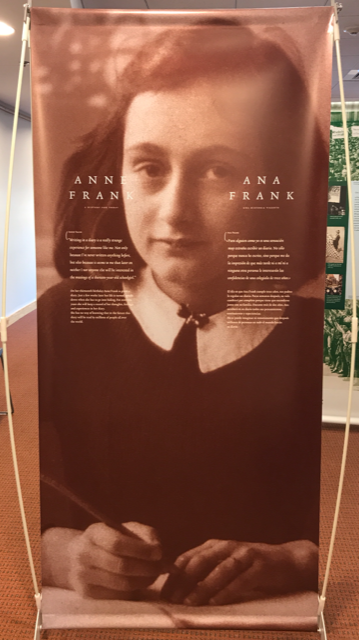“Anne Frank: A History for Today” Presents an Important Message about Prejudice
March 21, 2018
The political and social issue of prejudice is prevalent not only in the United States, but around the world. Throughout history, various people have been targeted because of their race, religion, sexual orientation, or gender. Perhaps no time in history was as difficult for people as that of the Holocaust. Every year, on January 27, International Holocaust Remembrance Day commemorates the Holocaust. In honor of this important commemoration, Otis Library hosted the traveling Smithsonian “Anne Frank: A History for Today” exhibit during the month of January.
Diane Deedy, Otis Library’s Youth Services librarian, stated, “History always needs to be remembered; it always needs to be studied. Just when we feel as if we know something, future generations may not. It’s important to introduce these lessons over and over again. I think that, ultimately, it leads to a healthy society.”
The exhibit tells the survival story of Anne Frank, a young Jewish girl whose journal was turned into a popular book, through photographs, quotations, and historical context. The panels include information about both the history of 20th century Germany and the life of the Frank family. Most importantly, it exemplifies the themes of diversity and acceptance through photographs of Jewish families, giving insight into their struggles.
Deedy added,“One of our goals [was] to have the community know the value of diversity and how they view themselves, but also how they view themselves in society. Another goal was to have community members think about the role of prejudice and how it can affect society, and how it can lead to isolation and even persecution of certain groups.”
This exhibit is particularly significant because it allows the community to learn how prejudices can lead to grave consequences.
“Things that initially might not seem very important can snowball into something that has disastrous consequences, and I think Anne Frank’s story is a perfect example of that,” Deedy explained.
Julie Kraig visited the exhibit and enjoyed the setup, which allowed her to walk around and read the panels at her own pace. She also emphasized the importance of understanding history so it will not repeat itself.
Kraig affirmed, “It’s important to see visuals and understand the people and who they were and where they came from and how politics really impacted them.”
This exhibit sends a powerful message, especially for today’s youth. The Otis Library has been working with local school systems to enable students to tour the exhibit and learn more about the history of the Holocaust. Six hundred and thirty students from Norwich Free Academy have visited the exhibit in addition to students from the Norwich Public Schools.

